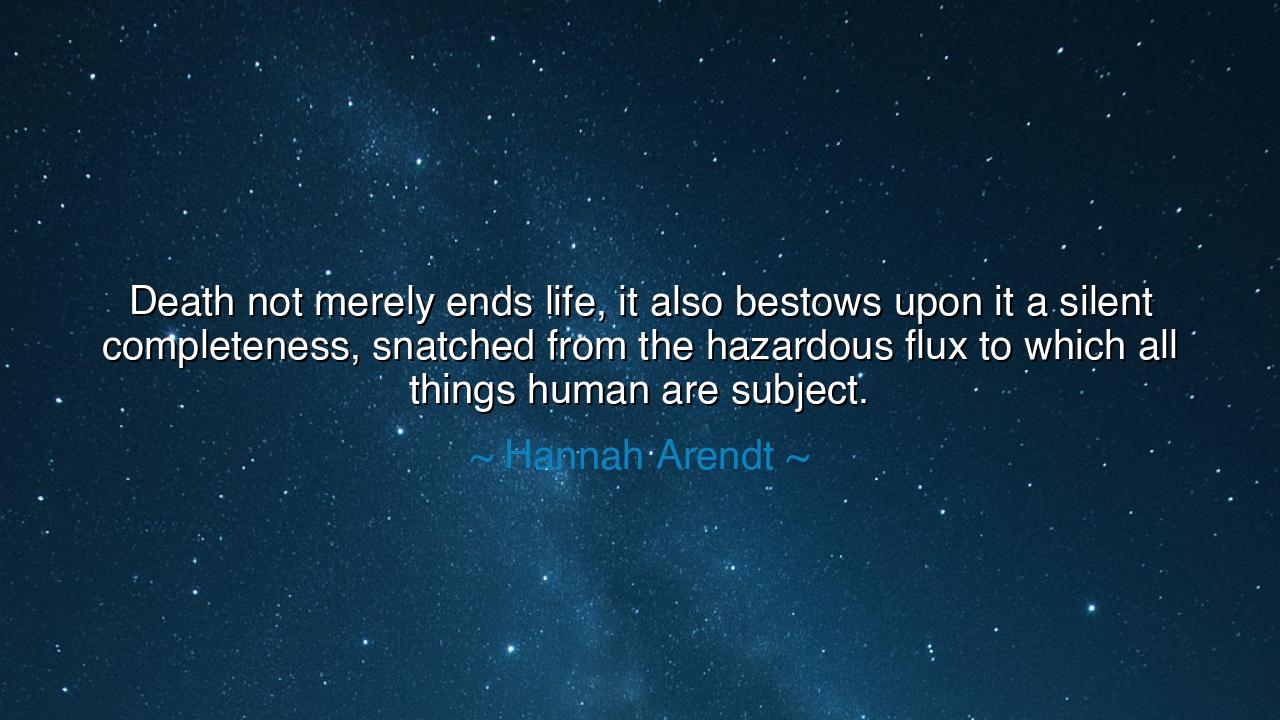
Death not merely ends life, it also bestows upon it a silent
Death not merely ends life, it also bestows upon it a silent completeness, snatched from the hazardous flux to which all things human are subject.






“Death not merely ends life, it also bestows upon it a silent completeness, snatched from the hazardous flux to which all things human are subject.” Thus wrote Hannah Arendt, the philosopher of existence and witness of a century scarred by chaos and catastrophe. In these words she captures a truth as profound as it is paradoxical: that death, though it appears to be an end, is also the seal that gives shape to life. Without death, our days would remain open and uncertain, suspended forever in the incompleteness of possibility. It is death that closes the circle, fixing our story in eternity, rescuing it from the endless, shifting tides of time.
The origin of this thought lies deep within Arendt’s reflections on mortality, history, and the human condition. She lived through the convulsions of the 20th century—exile, war, genocide, the fall of nations—and saw firsthand the fragility of human affairs. In that “hazardous flux” of politics and history, she perceived that nothing made by man could stand still. Empires crumble, memories fade, reputations wane. Yet death, she observed, arrests this movement. It grants the life that has been lived a kind of final form, transforming motion into meaning. In dying, a person’s story—once open, unpredictable, uncertain—becomes whole.
To bestow a silent completeness—this is death’s strange gift. The silence she speaks of is not emptiness, but peace: the stillness after the storm of living. As long as one breathes, life is unfinished, always vulnerable to chance, to failure, to misunderstanding. But in death, a life stands entire before the gaze of eternity, free from the accidents of tomorrow. The deeds are done; the words spoken; the arc of being traced. What remains is the legacy—the pattern that death alone allows us to perceive in full. Without an ending, the story of life could not be read.
This truth has been known since the ancients. When Socrates drank the hemlock, he did not curse his fate, but embraced it as the final act of a philosopher’s life. His death, unjust though it was, completed his teaching. By accepting it calmly, he proved the sincerity of all he had spoken. Had he fled or begged for mercy, his life’s meaning would have dissolved into contradiction. But in dying as he lived—with courage and clarity—his story found its silent completeness, and the centuries have remembered him not for his end, but for the harmony between his words and his death.
Arendt’s wisdom also reminds us of the difference between ending and completion. An ending may come suddenly, without warning or choice, but completeness is something deeper—it depends on how we live before the end arrives. To live with purpose, to act with integrity, to create something that outlasts us—these are the ways we prepare for death’s quiet seal. For death does not itself create meaning; it merely reveals it. The life that has been lived with consciousness and care shines in its stillness; the life squandered in forgetfulness remains a shadow even when finished.
And so, she calls us not to despair of death, but to revere it as part of the order of things. The fear of death arises from attachment to the flux—from our clinging to what is ever changing, ever slipping away. But the wise see that in death, the ceaseless motion ceases, and in that stillness the pattern emerges. Just as the artist’s brush must stop for the painting to be complete, so too must our striving come to rest. Death is not the enemy of life, but its completion—the moment when the clay hardens, the music ends, and the creation stands whole.
The lesson of Arendt’s words is both humbling and ennobling: live so that when death arrives, it finds you already complete. Let each day add a brushstroke to the story of your being. Do not waste your brief time in bitterness or fear, for these belong to the flux that death will sweep away. Instead, act with clarity, love deeply, and labor for what endures. For when your final silence comes, it will not be destruction, but consecration.
Thus, O listener, remember the wisdom of Hannah Arendt: death is not merely the end of breathing, but the completion of being. Welcome it not with dread, but with the calm of one who has lived truly. For in that silence, your life—no matter how brief or broken—becomes whole, rescued from the whirl of chance, and preserved forever in the stillness of eternity.






AAdministratorAdministrator
Welcome, honored guests. Please leave a comment, we will respond soon